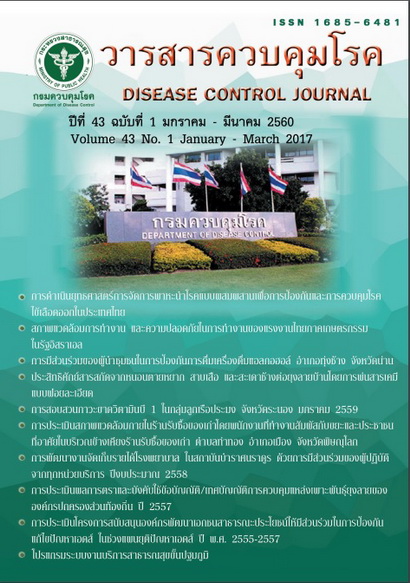Implementation of Integrated Vector Management (IVM) strategy for dengue prevention and control in Thailand
DOI:
https://doi.org/10.14456/dcj.2017.31Keywords:
Integrated Vector Management (IVM), dengue, AedesAbstract
Control of dengue vectors is considered as backbone and major control of dengue and dengue hemorrhagic fever since there is no antiviral drug and dengue vaccine is under development. Elimination of larval breeding places and insecticides have been applied to control larvae and adult of Aedes vectors. These control measures have been used for many decades. Vectors have developed resistant to insecticide and further these insecticides become contaminated to environment which possible effect to human and animals. This article reviews development of Integrated Vector Management (IVM) implementation to control vectors of dengue in Thailand based on World Health Organization principles and guidelines. The strategies are including situation analysis, development of course curriculum and training course, guidelines development, conducting pilot project and expand area of operations to provincial public health and local government. The IVM program began in 2009 and pilot project conducted at Ko Yoa Noi, Ko Yao District, Phangnga Province. The programme was expanded to 190 potential risk of dengue outbreaks districts throughout the country. The programme has been implemented with somewhat successfully. However, there were constraints and limitations at the ground levels. High levels of provincial public health offices and local administrations had not been adequately advocated therefore they had not paid much attention to the project. Moreover, local stakeholders, partners and field staff require more training to improve knowledge on basic information on vector and epidemiology of dengue transmission, including analysis and interpretation to local dengue transmission. It is recommended that infrastructures and human resources be considered strengthening for further improvement of program implementation at all levels, especially at local administrative offices, concerned staff, including stakeholders and partners. They need further training on basic information of vector and disease, IVM strategy and sound management of public health pesticide and insecticide resistance monitoring.
References
2. World Health Organization. Global strategic framework for integrated vector management. Geneva: World Health Organization; 2004.
3. World Health Organization. Integrated Vector Control. Seventh report of the WHO Expert Committee on Vector Biology and Control. World Health Organ Tech Rep Ser 1983;688:1-72.
4. World Health Organization. Vector control for malaria and other mosquito-borne diseases. WHO Technical Report Series 857. Geneva: World Health Organization; 1995.
5. World Health Organization. A frame work for implementing IVM at district level in the SEA Region: a step-by-step approach. New Delhi: World Health Organization, Regional Office for South-East Asia; 2008.
6. World Health Organization, Regional Office for South-East Asia. Regional Framework for an Integrated Vector Management Strategy for the South-East Asia Region. New Delhi: World Health Organization; 2005.
7. World Health Organization, Regional Office for South-East Asia. Report of the regional work¬shop to implement integrated management of disease vectors (IVM). Vector Control Research Centre; 2006 Dec 18-21; Puducherry and Tiruchirapalli, Tamil Nadu. New Delhi: WHO Regional Office for South-East Asia; 2007.
8. World Health Organization. WHO Position Statement on Integrated Vector Management. Geneva: World Health Organization; 2008.
9. World Health Organization, Regional Office for South-East Asia. Report of the regional training on integrated vector management 19-31 October 2011. India: World Health Organization; 2012.
10. World Health Organization. Core structure for training curricula on integrated vector manage¬ment. France: World Health Organization; 2012.
11. World Health Organization. Dengue vector management: Report of a regional workshop Colombo, Sri Lanka, 11-15 March 2013. India: World Health Organization; 2014.
12. สำนักโรคติดต่อนำโดยแมลง. รายงานการประชุมวิเคราะห์สถานการณ์และกำหนดทิศทางการจัดการแมลงพาหะนำโรคแบบผสมผสาน. การประชุมวิเคราะห์สถานการณ์และกำหนดทิศทาง การจัดการแมลงพาหะนำโรคแบบผสมผสาน; วันที่ 16-18 กุมภาพันธ์ 2552; โรงแรมกุยบุรี โฮเต็ล แอนด์ รีสอร์ท อำเภอกุยบุรี จังหวัด ประจวบคีรีขันธ์. นนทบุรี: สำนักโรคติดต่อ นำโดยแมลง; 2552.
13. สำนักโรคติดต่อนำโดยแมลง. หลักสูตรการจัดทำพาหะนำโรคแบบผสมผสาน. นนทบุรี: สำนักโรคติดต่อ นำโดยแมลง; 2552.
14. สำนักโรคติดต่อนำโดยแมลง. แนวทางการจัดการพาหะนำโรคสำหรับองค์กรปกครองส่วนท้องถิ่น. กรุงเทพมหานคร: ชุมนุมสหกรณ์การเกษตรแห่ง ประเทศไทย; 2555.
15. สำนักโรคติดต่อนำโดยแมลง. สรุปการประชุมเชิงปฏิบัติการพัฒนาศักยภาพบุคลากรในการจัดการพาหะนำโรคแบบผสมผสาน (IVM). การประชุมเชิงปฏิบัติการพัฒนาศักยภาพบุคลากรในการจัดการพาหะนำโรคแบบผสมผสาน (IVM); วันที่ 26-28 เมษายน 2554; โรงแรมพักพิงอิงทาง บูติค โฮเทล, จังหวัดนนทบุรี. นนทบุรี: 2554. หน้า 1-12.
16. สำนักโรคติดต่อนำโดยแมลง. สรุปการประชุมแลกเปลี่ยนเรียนรู้การจัดการพาหะนำโรคแบบผสมผสาน. การประชุมแลกเปลี่ยนเรียนรู้การจัดการพาหะนำโรคแบบผสมผสาน; วันที่ 17-18 พฤษภาคม 2555; โรงแรมลพบุรีอินน์รีสอร์ท, จังหวัดลพบุรี. นนทบุรี: 2555. หน้า 1-49.
17. สำนักโรคติดต่อนำโดยแมลง. รายงานประจำปี 2556 สำนักโรคติดต่อนำโดยแมลง. กรุงเทพมหานคร:อักษรกราฟฟิค แอนด์ ดีไซน์; 2556.
18. กรมควบคุมโรค. อำเภอควบคุมโรคเข้มแข็งแบบยั่งยืน ภายใต้ระบบสุขภาพอำเภอ (District Health Sys-tem Disease Control 2014). กรุงเทพมหานคร: กรมควบคุมโรค; 2557.
19. สำนักโรคติดต่อนำโดยแมลง. แนวทางการดำเนินงานพัฒนาอำเภอเข้มแข็งป้องกันควบคุมโรคไข้เลือดออก ปี 2557. นนทบุรี: สำนักโรคติดต่อนำโดยแมลง; 2557.
20. สำนักจัดการความรู้กรมควบคุมโรค. อำเภอควบคุมโรคเข้มแข็งแบบยั่งยืนภายใต้ระบบสุขภาพอำเภอ 2558 คู่มือการประเมินสำหรับสำนักงานป้องกันควบคุมโรคที่ 1-12. นนทบุรี: สำนักจัดการความรู้; 2558.
21. สำนักจัดการความรู้ กรมควบคุมโรค. อำเภอควบคุมโรค เข้มแข็งแบบยั่งยืนภายใต้ระบบสุขภาพอำเภอ 2559 คู่มือการประเมินสำหรับสำนักงานป้องกันควบคุมโรค. นนทบุรี: สำนักจัดการความรู้; 2559.
22. สำนักโรคติดต่อนำโดยแมลง. รายงานประจำปี 2557 สำนักโรคติดต่อนำโดยแมลง. กรุงเทพมหานคร: อักษร กราฟฟิค แอนด์ ดีไซน์; 2557.
23. สำนักโรคติดต่อนำโดยแมลง. รายงานประจำปี 2558 สำนักโรคติดต่อนำโดยแมลง. กรุงเทพมหานคร: อักษร กราฟฟิค แอนด์ ดีไซน์; 2558.
24. The Inter-Organization Programme for the Sound Management of Chemicals (IOMC). Workshop on sustainable approaches for pest and vector management and opportunities for collaboration in replacing POPs pesticides, Bangkok, 6-10 March 2000. Geneva: The Inter-Organization Programme for the Sound Management of Chem¬icals; 2000.
25. สำนักงานคณะกรรมการอาหารและยา. รายงานการ ประชุมระหว่างรัฐบาลว่าด้วยความปลอดภัย ด้านสารเคมี ครั้งที่ 6. การประชุมระหว่างรัฐบาล ว่าด้วยความปลอดภัยด้านสารเคมี ครั้งที่ 6; วันที่ 15-19 กันยายน 2551; กรุงดาการ์ ประเทศเซเนกัล. นนทบุรี: สำนักงานคณะกรรมการอาหารและยา; 2551.
Downloads
Published
How to Cite
Issue
Section
License
Articles published in the Disease Control Journal are considered as academic work, research or analysis of the personal opinion of the authors, not the opinion of the Thailand Department of Disease Control or editorial team. The authors must be responsible for their articles.



.png)



